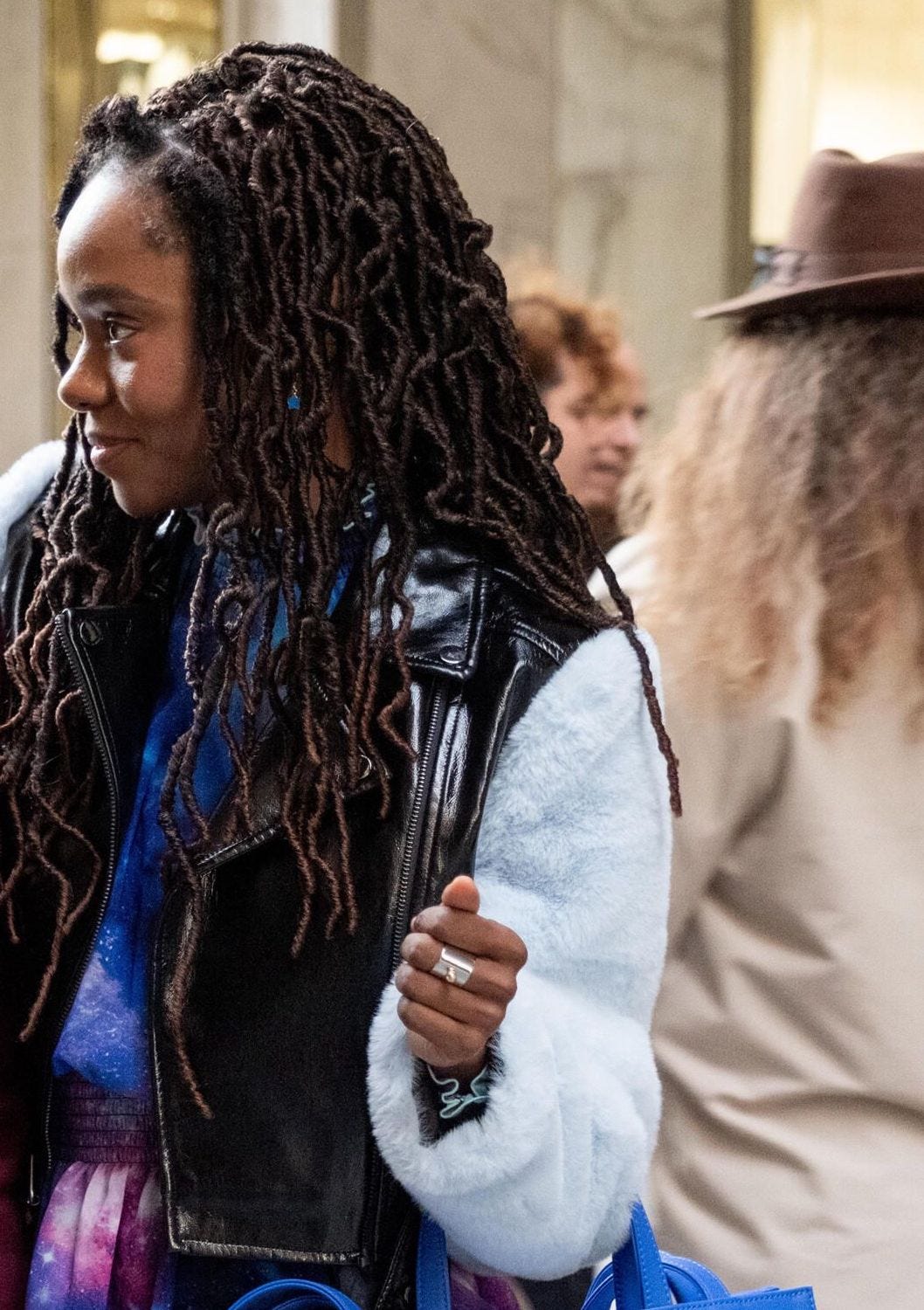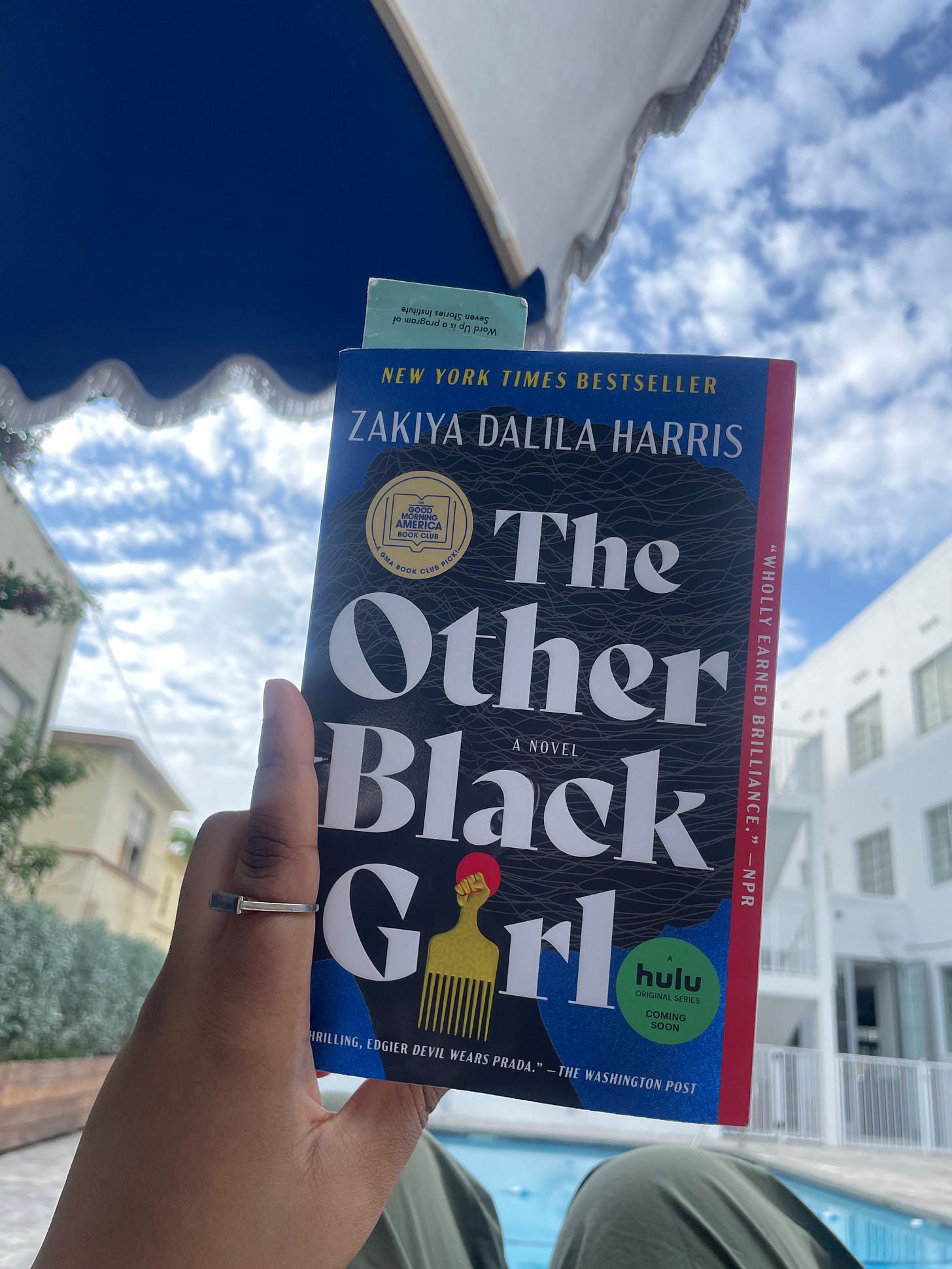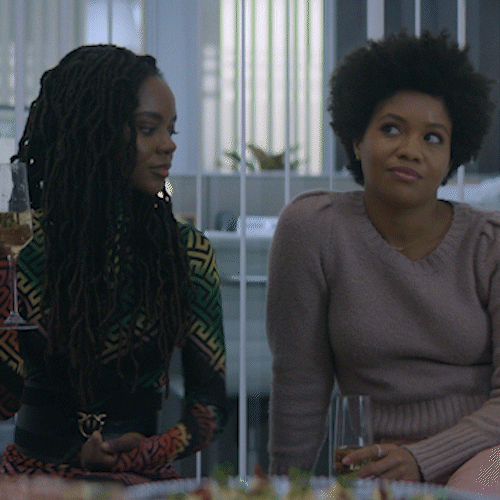IP is all the rage these days. Studios are more invested in adapting the work of buzz-worthy literature than the specialized talent of screenwriting. It’s why so many incredible BIPOC-created shows have faded away into the ether. I still think about how Vida deserved a more fleshed-out final season, or how Flatbush Misdemeanors’ second season wasn’t as strong as the first but I have a feeling the entire show wasn’t set up for success, and how High Fidelity would’ve landed better with audiences if it was developed by actual women of color who lived in New York (and if Oscar-nominee Da’Vine Joy Randolph wasn’t reduced to a lazy sidekick trope). So, it’s important to support Black shows, and to a larger degree works written by Black women because there is a deep history of their work being forgotten and erased. As such, I would like to start the first volume of this series “Book vs. Adaptation” by examining work made by a Black woman, Zakiya Dalila Harris.
My cousin gifted me The Other Black Girl after I told her I only wanted to watch the show after reading the book. I suggest you either read the book or watch the series before reading this. If you’re a no-spoilers person, bookmark this on your Substack app and come back after you’ve read and watched. After reading the book and binge-watching the series in 3 weeks, I can say that reading the book first wasn’t 100% necessary for getting into the show. I will explain why after the jump.
SPOILERS AHEAD
The Other Black Girl, The Book
With all works of fiction that get adapted onto the screen, there are always some sensory elements that are difficult to translate from the page to the screen. One thing I loved about the book is how we get introduced to Hazel by Nella smelling the scent of her hair grease. As we know (if you bothered to watch the series or read the book before reading this), hair grease ends up being a major plot point. Aside from this, the book on its own was not necessarily one I would’ve written home about. The writing style is very contemporary and specific to a Black millennial audience, which isn’t a bad thing but my personal taste leans more towards writing that has sharp sentence structure and prose. There were also a few plot holes that left me feeling a bit unsatisfied with the ending. Why did we never meet or see Hazel’s boyfriend, Manny, what was his purpose? If Hazel wanted Nella to find the files that showed she was an Involuntary, why didn’t she just find another way to indoctrinate her, especially considering how naive Nella was about Hazel’s intentions for the majority of the book? Shani was planning to blow the lid off the hair grease conspiracy but trying to do it through her white boss seemed haphazardly to me. Kendra Rae just completely fell out of the fold after the denouement, she wanted to wait out making a move, but why? We never find out. I also couldn’t tell if the woman in the epilogue was Nella, if it mattered, or what the author was trying to leave us with — (although I did love the full circle moment of that final line “What’s it really like here? You can be real with me, sis”. Which meant it could’ve been Hazel since she says this at the beginning of the book)
(You can find more in-depth thoughts on my readalong for this book)
The Other Black Girl, The Series
Developed by the author Zakiya Dalila Harris and Rashida Jones, The Other Black Girl hit Hulu last Fall (I’m late but you’re not going to fight me about it.) Where this series excels is in its expansion on the story’s themes and raised stakes. Unlike the novel where the reader is guessing for a good portion of the book whether Hazel is a villain or not, the series gets it all out in the open within the first episode. In terms of casting, I think it was mostly on point. Mellie Grant (I’m sorry, that is always going to be her name to me) is exactly how I imagined Vera to be. The lead actress who played Nella did a great job of capturing the awkward naivety of the novel’s protagonist However, Miss Hazel was a bit of a surprise for me. Aside from those horrible faux locs:

The actress played a lot younger and shorter than what I imagined Hazel to be (in the book it’s mentioned that Hazel is 4 inches taller than Nella so I was picturing someone with a Jessica Williams stature), but this is no shade to the actress, I think she did well, her portrayal was just a different character than what I had in mind. One of the elements that got lost from book to screen is how Hazel came off as very Afrocentric which underscored the confusion about her being a frenemy or not. Is she for the people or not? Was a question that I never asked of on screen Hazel because it was very apparent from the beginning that she wasn’t. I think keeping some of those elements would’ve made for a more complex relationship between Hazel and Nella on screen.
Nella was a touch more naive in the series, and not nearly as skeptical as she should’ve been given her ride-or-die bestie Malaika was desperately trying to keep her blinders open. I was so frustrated for Malaika (a queen!) who was really looking out for her best friend who had me rolling my eyes in nearly every scene she was in until the launch party where she finally wakes up after seeing Jesse Watson had switched sides, and Diana Gordon was never on hers.
In general, Nella is a walking paradox in that she is blindly ambitious but also is afraid to take up space. She is extremely conscientious and hypervigilant about the feelings and thoughts of her white bosses and co-workers. The book started a conversation about codeswitching and selling out but the series took it a step further by examining Nella’s professional complacency, and conditioned inferiority. Nella’s desire to get approval at work directly parallels her tolerance of Hazel’s behavior, she never wants to rock the boat— even when the captain is steering her off course. She is so blinded by her goals that she lacks the discernment to see she’s putting herself in a bad position. This is perfectly articulated in her conversation with Jesse Watson in episode 6:









One of the critiques of the show that I’ve seen is that the supernatural elements (like the walls shaking and the sounds of Kendra warning Nella) don’t pay off. This is the one instance where I feel like having the context of the book would help the viewer. It’s challenging to articulate the inner turmoil and paranoia Nella was experiencing from the book to the screen without it feeling too on the nose in the dialogue, so I didn’t mind those suspense elements not leading anywhere. I also think some viewers walked into the show thinking it was a suspense/horror but it was more like a drama with some thriller elements sprinkled in, which helped the story feel a bit more grounded (as grounded as a story about hair grease morphing the personalities of Black women can be).
Overall, the key takeaway of both the book and the show is that hierarchal systems created by people who do not relate to our experiences cannot be changed from within, they have to be divested from and deconstructed. The questions being asked are what are the limits of representational progress and what is the cost of maintaining your integrity as a Black person working in predominately white spaces? The series ended on a note where I could see a second season happening (possibly focusing on Nella, Kendra, and Malaika taking down Diana, and Hazel trying to win back Nella’s friendship) but if it doesn’t happen, viewers won’t be left feeling completely salty. This is a smart approach considering how hard it is for Black shows to get past 1-2 seasons these days.
The Other Black Girl, Personal Reflections
While this is a workplace drama, the themes in The Other Black Girl caused me to reflect on the current era of Black excellence and celebrity culture that we are living through. Most specifically, there have been a lot of conversations about the lack of celebrity support for Palestinian liberation. Beyoncé, specifically, has gotten a lot of heat because she has co-opted the words and aesthetics of radical Black leaders in her performances and visuals without actually walking in that tradition. Although she is one of the most visible Black women in the world, with more wealth than most of us will ever see, she either doesn’t feel empowered to show solidarity with Palestinians (for many reasons we can guess but will never know for sure) or she simply does not care. If it’s the former, that speaks to the lack of agency she has as a public figure and business entity, if it’s the latter that speaks to the insularity of the elite world she’s navigating. All of this makes it clear to me that Beyoncé, like most elite Black women, are OBGs (Other Black Girls). I theorize that OBGs are disconnected from Black and/or global liberation movements because they believe wealth and access are essential for their personal liberation. To obtain these, they must show deference to individuals who uphold systems like white supremacy and imperialism. This again, is another example of the phrase “none of us are free until all of us are free” because if your freedom is contingent upon your silence, your refusal to use your hard-earned power to give voice to people who need to be heard, then how free are you, really?
I don't mean to single out Beyoncé because people can say much of the same things about Rihanna, Oprah Winfrey, Michelle Obama, or anyone else of their caliber. I also don’t mean to suggest that everyone should be a community organizer. However, there is something that shifts when Black people and more specifically, Black women ascend to higher social classes via their professional success. As women, being deferential is deeply embedded in how we are conditioned, this is even more true for those of us who are Black and occupy predominately white spaces (like Nella). Perhaps that’s why genocide-supporting brand deals are still on the table, and calls to reconsider showcasing artistic work in occupied territories have been ignored. It says a lot that even the most powerful among us struggle with taking stances that will yield real transformative change. I’m a broke person so I can’t pretend to know what these people stand to lose, but what I imagine is that a piece of you is laid to rest to survive in the bubble of elitism, and that when your personal values are aligned with systems of oppression (specifically capitalism), you can never truly stand for anything other than your own interests.
Wealth and privilege can be a numbing agent for anybody, much like the hair grease in The Other Black Girl, regardless of race or gender. Most elite people’s only interaction with folks who aren’t ultra privileged is through some form of commerce, which is why many of them have a hard time seeing our humanity, we are numbers to them. This leads to the sad realization that the only tangible connection we have to many of the famous Black women we admire is through purchasing their products, whether that product is a memoir, a lip gloss, or tickets to one of the most expensive live concerts in recent history. The inspiration we get from reading the memoirs, the feelings we get when we wear the lip gloss, and the experiences we have when we’re at the concert are cursory at best, yet it’s sold to us in a way that makes us feel like it’s impacting our lives and pushing our culture forward in a truly meaningful way— when often, it is not. We think because we share gender and racial identifiers that it automatically creates a significant shared experienced but to not acknowledge the way class differences sever our connections to one another (especially when the upper class is not consistently working towards staying connected to lower class people in a real way), is as naive as Nella finding out Hazel had another identity, and not batting an eye at that.
One of Nella’s heroes, Diana Gordon, the author of her favorite book, Burning Heart administered hair grease as a means of suppression and control. After the success of her book, Gordon sold out her best friend/editor Kendra Rae Philips (another one of Nella’s heroes) which sends Philips into exile. Gordon begins indoctrinating countless impressionable Black girls with this hair grease so they can excel professionally and take up more space in industries that have traditionally shut them out. It all felt very much like trying to dismantle the master’s house with the master’s tools. I walked away from the series and book bothered by the fact that it’s one Black woman forcing other Black women into complacency as a means to excel. To imply that the only way we can win is through selling out is the same as saying there is no way for us to win at all because these systems were not designed for us to do so, authentically. As disappointing as that notion is, it’s not that different from watching people we admire who have accomplished so much by white supremacist-capitalist standards lack the social awareness or agency to use their platforms in a way that is conducive to our collective liberation. The biggest lesson to take away from this is that, it’s not us that needs to change, it’s the images, language, behavior and performances that gatekeepers expect us to contort ourselves into.
If you liked the first edition of this series, please share, leave a comment, or like it! I’m thinking of doing Black Cake or The Changeling next but let me know if you have any suggestions!
Catch me on these digital streets.
Watch My Short Film “One Of The Guys” 🎥
Instagram 🤳🏾
TikTok ⏰
Website 👩🏾💻
Merch 🛍️
💋 ✌🏾
With love,
LaChelle









This was the analysis of *The Other Black Girl* that I needed! Thank you!